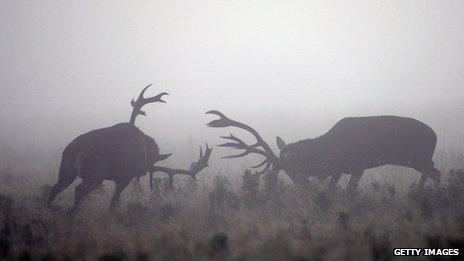Concern over culling of red deer
- Published

Estate owner Jamie Williamson said there had been a decline in older stags
A sporting estate owner has warned that the culling of red deer has damaged Scotland's deer stalking economy.
Numbers of the animals are controlled in some areas to protect forestry and aid the regeneration of native woodlands.
But Jamie Williamson, who owns an estate in Strathspey, said too many were being culled and that the quality of deer had been affected.
Scottish Natural Heritage (SNH) said red deer were not under threat.
The public agency has responsibility for regulating and administering the system of wild deer management in Scotland.
According to reports commissioned by SNH, there are between 360,000 and 400,000 red deer in Scotland.
Deer hunting has been estimated to be worth £105m a year, with £70.4m of that money remaining in Scotland.
'Younger stags'
However, Mr Williamson said the health of the industry was at risk.
He said: "What we are seeing are less mature stags on the hill, and we are now beginning to get concerned."
Mr Williamson said that a neighbouring estate used to shoot 40 to 45 stags a year, but in 2011 that figure fell to 11.
He added: "We are seeing that drop. The quality, or the mature stag, isn't there. You are shooting younger and younger stags.
"We are getting concerned that we might actually destroy our whole stalking system."
SNH said the numbers of deer being culled had remained steady, at about 55,000 to 60,000, for almost a decade.
Alister MacGugan, a deer expert at the agency, said: "We certainly aren't seeing the demise of the red deer in Scotland.
"There has been a change of what some people want to do with their land.
"Where it might have predominantly been deer stalking the primary interest is now grouse, so they are wanting less deer, or interest is in the natural regeneration of woodland."
Mr MacGugan said more deer may be being culled in some areas, but numbers of the animals were higher in other parts.
- Published30 October 2012
- Published27 November 2012
- Published24 October 2012
- Published20 March 2012
- Published2 March 2012
- Published23 November 2011